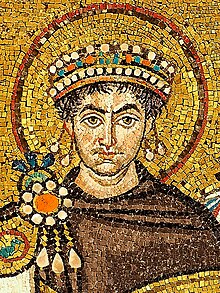Last of the Romans



The term Last of the Romans (Ultimus Romanorum) has historically been used to describe a man thought to embody the values of Ancient Roman civilization—values which, by implication, became extinct on his death. It has been used to describe a number of individuals. The first recorded instance was Julius Caesar's description of Marcus Junius Brutus the Younger as the one with whom the old Roman spirit would become extinct.
List of people described as the "Last of the Romans"
- Gaius Cassius Longinus (d. 42 BC), so called by Brutus and by the ancient historian Aulus Cremutius Cordus.
- Gaius Asinius Pollio (BC 75 – AD 4), one of the last great orators and writers of the Roman Republic.
- Valentinian I (321-375), the last Western Emperor to campaign extensively on both sides of the Rhine and Danube frontiers[1]
- Valens (328–378), the Eastern Emperor (and brother of Valentinian I) who led his army to a catastrophic defeat in the Battle of Adrianople.
- Stilicho, a powerful Roman general in the early 5th century.[2]. Touted by Edward Gibbon as '“the last of the Roman generals' in Chapter XXX of The History of the Decline and Fall of the Roman Empire.[3]
- Flavius Aëtius (396?–454), a general in the late Western Roman Empire who defended the Gauls against the Franks and other barbarians, and defeated Attila in the Catalaunian Fields near Châlons, in 451. So called by Procopius.[2]
- Count Boniface (died 432), a general in the late Western Roman Empire. Rival of Flavius Aëtius. So called by Procopius.[2]
- Galla Placidia (388-450), empress consort to Constantius III and mother of Valentinian III, she was "the last Roman empress"[4] and de facto ruler of the Western Roman Empire from 425-437.
- Majorian (420–461), Roman Emperor between 457 and 461. He was the last western emperor to attempt to restore the western empire, and briefly reconquered much of the lost territories in Gaul and Hispania.
- Ambrosius Aurelianus (5th century), a Romano-British military commander against the Anglo-Saxon invasion. So called by Gildas.[5]
- Ovida (?–480) the last Roman commander in Illyricum, defeated and killed by Odoacer.
- Syagrius (430–486/487), the last Roman commander in Gaul (hailed as "King of the Romans") before the invasion of the Franks.[6]
- Anicius Manlius Severinus Boethius (480–525?), one of the last great philosophers of Rome. He was regarded as last of the Romans and first of the medieval scholastics in a famous word by Martin Grabmann.[7]
- Gildas (fl. early 6th century), Romano-British clergyman and writer.[8]
- Justinian I "the Great" (482?–565), second of the Justinian Dynasty, and probably the last Byzantine emperor to speak Latin as a first language.[9]
- Flavius Belisarius (505?–565), a widely acclaimed general of the Byzantine Empire under Justinian, known for his reconquest of portions of the Western Empire.[10]
- Flavius Magnus Aurelius Cassiodorus Senator (c. 485 – c. 580), Roman statesman and writer.[11]
- Gregory the Great (540?–604), an influential Pope and native to Rome.[12]
- Desiderius of Cahors (580?–655), Gallo-Roman aristocrat and bishop.[13]
- William Congreve, called "Ultimus Romanorum" by Alexander Pope.[2]
- Samuel Johnson, called "Ultimus Romanorum" by Thomas Carlyle.[14]
In the United States
In the United States, "last of the Romans" was used on numerous occasions during the early 19th century as an epithet for the political leaders and statesmen who participated in the American Revolution by signing the United States Declaration of Independence, taking part in the American Revolutionary War, or established the United States Constitution.[15]
List of rulers who, in a more literal sense, also could be described as "Last of the Romans"
- Romulus Augustulus, the last de facto Western Roman Emperor.
- Julius Nepos, the last de jure Western Roman Emperor.
- Llywelyn ap Gruffudd, the last Prince of the Kingdom of Gwynedd, the last post-Roman (Romano-British) successor state to fall in the West.[16]
- Constantine XI Paleologus, the last Eastern Roman Emperor.
- David II Komnenos, final emperor of Trebizond and de facto final Roman Emperor after Constantine XI.
References
- ^ https://rear-view-mirror.com/2015/10/31/valentinian-i-the-last-of-the-triumphant-roman-emperors-in-the-west/
- ^ a b c d Brewer, E. Cobham (1898). Dictionary of Phrase and Fable.
- ^ http://www.danielang.net/2016/06/22/gibbon-part-4/
- ^ Sivan, Hagith (2011). Galla Placidia: The Last Roman Empress. Oxford University Press. ISBN 0195379136.
- ^ http://www.britannia.com/history/ebk/articles/ambros02.html
- ^ Pocock, J.G.A. (2015). Barbarism and Religion: Volume 6, Barbarism: Triumph in the West. Cambridge University Press. p. 461. ISBN 1316300307.
- ^ http://www.hottopos.com/convenit5/01.htm
- ^ Kerlouégan, François (1987). Le De Excidio Britanniae de Gildas. Paris: Publications de la Sorbonne. p. 579.
- ^ Wickham, Chris (2009). The Inheritance of Rome. Penguin Books. p. 90. ISBN 978-0-670-02098-0.
- ^ https://tredition.com/book-of-the-month/book-of-the-month-january-2018-us/
- ^ https://cems.ceu.edu/events/2011-05-12/last-romans-cassiodorus-between-rome-ravenna-and-constantinople
- ^ "Message for the 14th centenary of the death of Pope St Gregory the Great". The Vatican. 22 October 2003.
- ^ Mathisen, Ralph W. (2013). Desiderius of Cahors: Last of the Romans (part of "Gallien in Spätantike und Frühmittelalter" conference proceedings). De Gruyter. p. 455. ISBN 3110260778.
- ^ Carlyle, Thomas (1840). On Heroes, Hero-worship, and the Heroic in History.
- ^ Elizabeth Fox-Genovese; Eugene D. Genovese (2005). The Mind of the Master Class: History and Faith in the Southern Slaveholders' Worldview. Cambridge University Press. p. 278.
- ^ Ward-Perkins, Bryan (2000). Why Did the Anglo-Saxons Not Become More British. Oxford: Trinity College.
